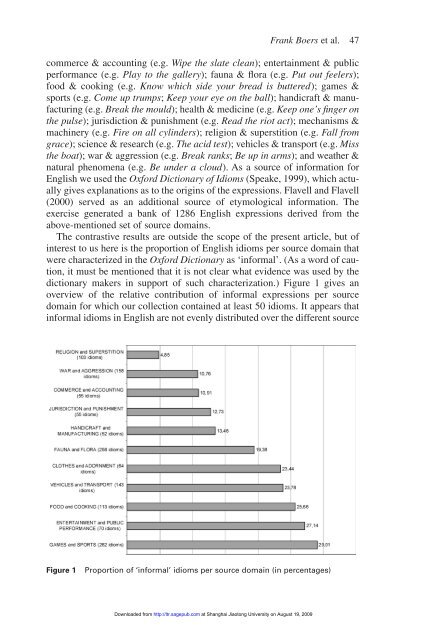Language Teaching Research
Language Teaching Research
Language Teaching Research
You also want an ePaper? Increase the reach of your titles
YUMPU automatically turns print PDFs into web optimized ePapers that Google loves.
Frank Boers et al. 47<br />
commerce & accounting (e.g. Wipe the slate clean); entertainment & public<br />
performance (e.g. Play to the gallery); fauna & flora (e.g. Put out feelers);<br />
food & cooking (e.g. Know which side your bread is buttered); games &<br />
sports (e.g. Come up trumps; Keep your eye on the ball); handicraft & manufacturing<br />
(e.g. Break the mould); health & medicine (e.g. Keep one’s finger on<br />
the pulse); jurisdiction & punishment (e.g. Read the riot act); mechanisms &<br />
machinery (e.g. Fire on all cylinders); religion & superstition (e.g. Fall from<br />
grace); science & research (e.g. The acid test); vehicles & transport (e.g. Miss<br />
the boat); war & aggression (e.g. Break ranks; Be up in arms); and weather &<br />
natural phenomena (e.g. Be under a cloud). As a source of information for<br />
English we used the Oxford Dictionary of Idioms (Speake, 1999), which actually<br />
gives explanations as to the origins of the expressions. Flavell and Flavell<br />
(2000) served as an additional source of etymological information. The<br />
exercise generated a bank of 1286 English expressions derived from the<br />
above-mentioned set of source domains.<br />
The contrastive results are outside the scope of the present article, but of<br />
interest to us here is the proportion of English idioms per source domain that<br />
were characterized in the Oxford Dictionary as ‘informal’. (As a word of caution,<br />
it must be mentioned that it is not clear what evidence was used by the<br />
dictionary makers in support of such characterization.) Figure 1 gives an<br />
overview of the relative contribution of informal expressions per source<br />
domain for which our collection contained at least 50 idioms. It appears that<br />
informal idioms in English are not evenly distributed over the different source<br />
Figure 1 Proportion of ‘informal’ idioms per source domain (in percentages)<br />
Downloaded from<br />
http://ltr.sagepub.com at Shanghai Jiaotong University on August 19, 2009














